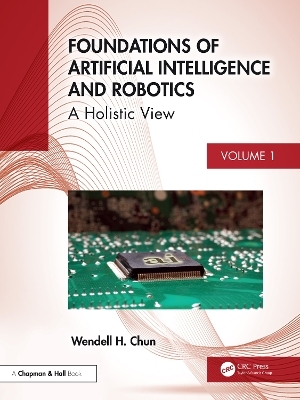
Foundations of Artificial Intelligence and Robotics
Volume 1 A Holistic View
Seiten
2026
Chapman & Hall/CRC (Verlag)
978-1-032-67312-7 (ISBN)
Chapman & Hall/CRC (Verlag)
978-1-032-67312-7 (ISBN)
- Noch nicht erschienen (ca. Oktober 2026)
- Versandkostenfrei innerhalb Deutschlands
- Auch auf Rechnung
- Verfügbarkeit in der Filiale vor Ort prüfen
- Artikel merken
Artificial Intelligence (AI) is a complicated science that combines philosophy, cognitive psychology, neuroscience, mathematics and logic (logicism), economics, computer science, computability, and software.
Artificial intelligence (AI) is a complicated science that combines philosophy, cognitive psychology, neuroscience, mathematics and logic (logicism), economics, computer science, computability, and software. Meanwhile, robotics is an engineering field that compliments AI. There can be situations where AI can function without a robot (e.g., Turing Test) and robotics without AI (e.g., teleoperation), but in many cases, each technology requires each other to exhibit a complete system: having "smart" robots and AI being able to control its interactions (i.e., effectors) with its environment. This book provides a complete history of computing, AI, and robotics from its early development to state‑of‑the‑art technology, providing a roadmap of these complicated and constantly evolving subjects.
Divided into two volumes covering the progress of symbolic logic and the explosion in learning/deep learning in natural language and perception, this first volume investigates the coming together of AI (the mind) and robotics (the body), and discusses the state of AI today.
Key Features:
Provides a complete overview of the topic of AI, starting with philosophy, psychology, neuroscience, and logicism, and extending to the action of the robots and AI needed for a futuristic society
Provides a holistic view of AI, and touches on all the misconceptions and tangents to the technologies through taking a systematic approach
Provides a glossary of terms, list of notable people, and extensive references
Provides the interconnections and history of the progress of technology for over 100 years as both the hardware (Moore’s Law, GPUs) and software, i.e., generative AI, have advanced
Intended as a complete reference, this book is useful to undergraduate and postgraduate students of computing, as well as the general reader. It can also be used as a textbook by course convenors. If you only had one book on AI and robotics, this set would be the first reference to acquire and learn about the theory and practice.
Artificial intelligence (AI) is a complicated science that combines philosophy, cognitive psychology, neuroscience, mathematics and logic (logicism), economics, computer science, computability, and software. Meanwhile, robotics is an engineering field that compliments AI. There can be situations where AI can function without a robot (e.g., Turing Test) and robotics without AI (e.g., teleoperation), but in many cases, each technology requires each other to exhibit a complete system: having "smart" robots and AI being able to control its interactions (i.e., effectors) with its environment. This book provides a complete history of computing, AI, and robotics from its early development to state‑of‑the‑art technology, providing a roadmap of these complicated and constantly evolving subjects.
Divided into two volumes covering the progress of symbolic logic and the explosion in learning/deep learning in natural language and perception, this first volume investigates the coming together of AI (the mind) and robotics (the body), and discusses the state of AI today.
Key Features:
Provides a complete overview of the topic of AI, starting with philosophy, psychology, neuroscience, and logicism, and extending to the action of the robots and AI needed for a futuristic society
Provides a holistic view of AI, and touches on all the misconceptions and tangents to the technologies through taking a systematic approach
Provides a glossary of terms, list of notable people, and extensive references
Provides the interconnections and history of the progress of technology for over 100 years as both the hardware (Moore’s Law, GPUs) and software, i.e., generative AI, have advanced
Intended as a complete reference, this book is useful to undergraduate and postgraduate students of computing, as well as the general reader. It can also be used as a textbook by course convenors. If you only had one book on AI and robotics, this set would be the first reference to acquire and learn about the theory and practice.
Wendell Chun has thirty-plus years designing and building robots with autonomous capability at the former Martin Marietta Space Systems Company. He is currently a Director in Systems Engineering and Assistant Professor at the University of Denver. Professor Chun bridges industry, academia, and government in the areas of robotics and artificial intelligence, serving as a consultant, subject matter expert, and reviewer in this field since the early 1980’s.
Foreword
About the Author
1. AI Background
2. Robotics
3. Autonomy
4. Artificial Intelligence
5. Integrating Artificial Intelligence and Robotics
6. Artificial Intelligence: Today
7. Epilogue
8. Glossary of Terms
9. List of Figures
10. References
| Erscheint lt. Verlag | 9.10.2026 |
|---|---|
| Zusatzinfo | 146 Line drawings, color; 34 Halftones, color; 180 Illustrations, color |
| Sprache | englisch |
| Maße | 210 x 280 mm |
| Themenwelt | Informatik ► Theorie / Studium ► Künstliche Intelligenz / Robotik |
| Technik ► Umwelttechnik / Biotechnologie | |
| ISBN-10 | 1-032-67312-5 / 1032673125 |
| ISBN-13 | 978-1-032-67312-7 / 9781032673127 |
| Zustand | Neuware |
| Haben Sie eine Frage zum Produkt? |
Mehr entdecken
aus dem Bereich
aus dem Bereich
Buch | Softcover (2024)
REDLINE (Verlag)
20,00 €
Eine kurze Geschichte der Informationsnetzwerke von der Steinzeit bis …
Buch | Hardcover (2024)
Penguin (Verlag)
28,00 €


